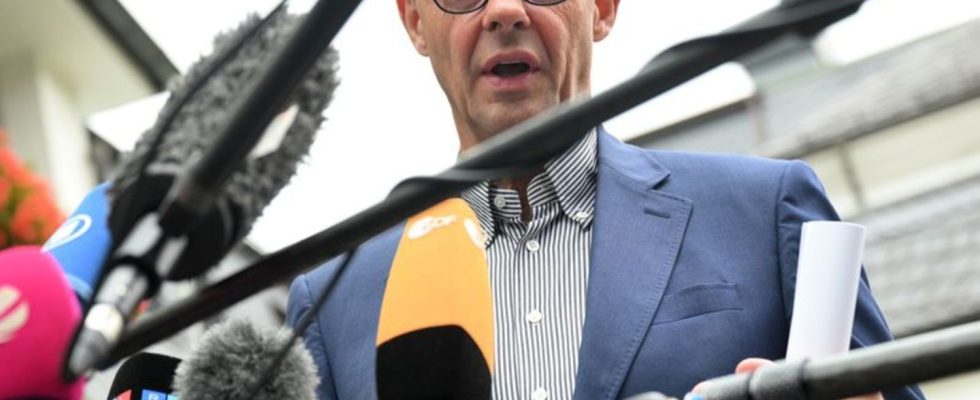Union faction leader Friedrich Merz invited the top of his faction to the Sauerland. After debates about the AfD and the K question, he wants to go on the offensive. Will that drive the polls up?
The head of the Union faction in the Bundestag starts the second half of the legislative period with a general settlement with the traffic light government. “It’s no use to us if we do the best climate protection here by shutting down industry, prosperity in Germany is massively reduced and CO2 emissions continue happily around the world,” said parliamentary group leader Friedrich Merz on Friday at the end of a conference Retreat of the head of the CDU/CSU deputies.
In addition to rejecting central traffic light projects such as the increase in citizen income next year or basic child security, the CDU leader also insisted on a no to the heating law in the Bundestag.
Merz: Growth Opportunities Act goes in the right direction
Merz, on the other hand, does not want to give the Union-led countries any instructions on how to vote in the Bundesrat on the controversial Growth Opportunities Act. “There is a certain tendency in our parliamentary group – subject, of course, to the final texts and legislation – to agree to this Growth Opportunities Act, because in our opinion it is at least going in the right direction,” said Merz. “Relieving the economy, including taxes and levies, is not wrong now in this situation that we are in.”
What happens in the Bundesrat would have to be decided by the federal states, which would help finance the law and clarify the issues with the federal government, said Merz. “In any case, I will not make any specifications as to how the B countries, i.e. how the countries co-governed by the Union, behave towards this law in the Bundesrat.”
The federal government wants to help the German economy with tax relief for companies until 2028 and an acceleration of approval procedures. The relief in the so-called Growth Opportunities Act should amount to seven billion euros annually.
Dobrindt: A few screws are still loose at Ampel
CSU regional group chief Alexander Dobrindt criticized the recent government retreat: “The therapy session of the traffic light in Meseberg was ineffective”, the dispute goes on. There is talk of a major social reform that the FDP rejects and the SPD and Greens obviously support. Against the background of a quote from Federal Finance Minister Christian Lindner (FDP), he added: “Despite hammering and screwing at the traffic lights, a few screws were obviously still loose.” Lindner had explained: “We are a government where hammering and screwing takes place. That leads to noise, as you have already noticed. But something also comes out of it.”
“Sauerland declaration” against a weakening economy
In Schmallenberg, Merz’s home region, the leaders of the Union faction passed a package of measures to boost the ailing economy and to relieve people and companies quickly and noticeably. The “Sauerland Declaration” entitled “Take action: secure prosperity, create growth” contains proposals from the CDU/CSU opposition faction – they cannot implement them on their own. The Union should hope that the polls will increase with the concrete proposals. The numbers have been bobbing below the 30 percent mark for months. And that despite the ongoing quarrels of the traffic light coalition.
Merz on surveys: Weakness not recognizable
Merz was optimistic in view of an Allensbach study commissioned by the Union faction. There was a small dent in the polls in the summer, “it’s evened out”. Now the curve is clearly pointing upwards. The Union is at 30 percent and the political mood between 34 and 35 percent. For the coalition parties, the curve continues to point downwards. The Union is now almost as strong as the SPD and the Greens together. “I can’t see that this is a pronounced weakness. On the contrary,” said Merz. The SPD, on the other hand, is at a “low for a chancellor’s party that has never been seen before in Germany.”
“Load brake” at 40 percent
The economic paper states that social security contributions should be capped at 40 percent. Overtime and work after retirement age should be made tax-free. “Anyone who works alongside their pension should be able to earn up to 2,000 euros per month tax-free,” it continues. The total tax burden on companies must be capped at 25 percent.
“Bridge electricity price” for industry
While the traffic light government is reducing the energy supply, the Union wants to expand it. The goal is an electricity price below 20 cents per kilowatt hour – including all taxes and duties, the Union demands. The electricity tax must immediately drop to the legal EU minimum of 0.05 cents per kilowatt hour. Network charges should be halved. In addition, a quantum leap in grid expansion, the construction of new gas-fired power plants and the expansion of renewable energies is necessary.
For the energy-intensive industry, the high energy costs are a massive competitive disadvantage in a particular way. In order to compensate for this, “we expect the federal government to come up with a calculated concept for a time-limited bridging electricity price that is also effective for medium-sized industrial companies”.
SPD speaks of a wish-you-what package
SPD parliamentary group leader Achim Post criticized the package of measures as a “make-a-wish package without serious financing”. If you look at the various demands, “you get the impression that the way from the chancellery to cloud cuckoo land is quite short”.

